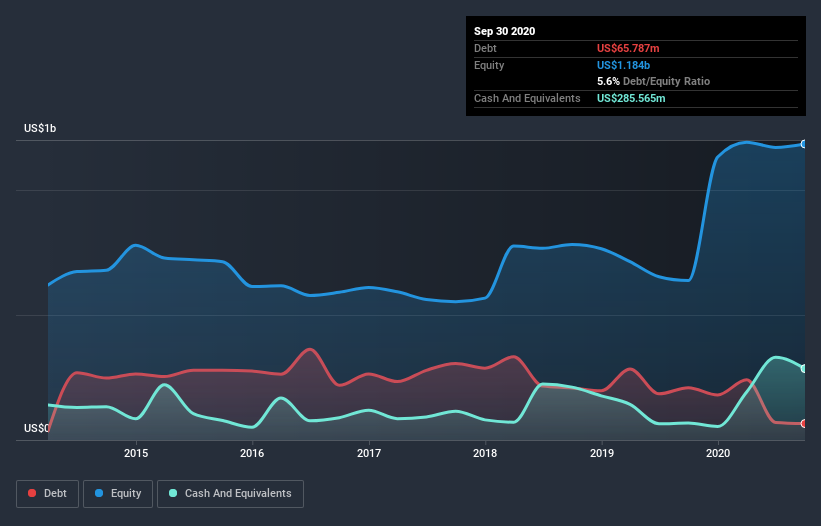
Legendary fund manager Li Lu (who Charlie Munger backed) once said, 'The biggest investment risk is not the volatility of prices, but whether you will suffer a permanent loss of capital.' So it seems the smart money knows that debt - which is usually involved in bankruptcies - is a very important factor, when you assess how risky a company is. As with many other companies Renewable Energy Group, Inc. (NASDAQ:REGI) makes use of debt. But the more important question is: how much risk is that debt creating?
What Risk Does Debt Bring?
Generally speaking, debt only becomes a real problem when a company can't easily pay it off, either by raising capital or with its own cash flow. Ultimately, if the company can't fulfill its legal obligations to repay debt, shareholders could walk away with nothing. However, a more common (but still painful) scenario is that it has to raise new equity capital at a low price, thus permanently diluting shareholders. By replacing dilution, though, debt can be an extremely good tool for businesses that need capital to invest in growth at high rates of return. When we think about a company's use of debt, we first look at cash and debt together.
Check out our latest analysis for Renewable Energy Group
What Is Renewable Energy Group's Net Debt?
The image below, which you can click on for greater detail, shows that Renewable Energy Group had debt of US$65.8m at the end of September 2020, a reduction from US$209.4m over a year. But on the other hand it also has US$285.6m in cash, leading to a US$219.8m net cash position.

How Healthy Is Renewable Energy Group's Balance Sheet?
Zooming in on the latest balance sheet data, we can see that Renewable Energy Group had liabilities of US$232.2m due within 12 months and liabilities of US$44.0m due beyond that. Offsetting this, it had US$285.6m in cash and US$207.2m in receivables that were due within 12 months. So it actually has US$216.6m more liquid assets than total liabilities.
This short term liquidity is a sign that Renewable Energy Group could probably pay off its debt with ease, as its balance sheet is far from stretched. Simply put, the fact that Renewable Energy Group has more cash than debt is arguably a good indication that it can manage its debt safely.
Although Renewable Energy Group made a loss at the EBIT level, last year, it was also good to see that it generated US$627m in EBIT over the last twelve months. When analysing debt levels, the balance sheet is the obvious place to start. But it is future earnings, more than anything, that will determine Renewable Energy Group's ability to maintain a healthy balance sheet going forward. So if you're focused on the future you can check out this free report showing analyst profit forecasts.
Finally, a business needs free cash flow to pay off debt; accounting profits just don't cut it. While Renewable Energy Group has net cash on its balance sheet, it's still worth taking a look at its ability to convert earnings before interest and tax (EBIT) to free cash flow, to help us understand how quickly it is building (or eroding) that cash balance. Over the last year, Renewable Energy Group recorded free cash flow worth a fulsome 84% of its EBIT, which is stronger than we'd usually expect. That positions it well to pay down debt if desirable to do so.
Summing up
While it is always sensible to investigate a company's debt, in this case Renewable Energy Group has US$219.8m in net cash and a decent-looking balance sheet. And it impressed us with free cash flow of US$526m, being 84% of its EBIT. So is Renewable Energy Group's debt a risk? It doesn't seem so to us. When analysing debt levels, the balance sheet is the obvious place to start. However, not all investment risk resides within the balance sheet - far from it. For instance, we've identified 1 warning sign for Renewable Energy Group that you should be aware of.
Of course, if you're the type of investor who prefers buying stocks without the burden of debt, then don't hesitate to discover our exclusive list of net cash growth stocks, today.
If you’re looking to trade Renewable Energy Group, open an account with the lowest-cost* platform trusted by professionals, Interactive Brokers. Their clients from over 200 countries and territories trade stocks, options, futures, forex, bonds and funds worldwide from a single integrated account. Promoted
New: AI Stock Screener & Alerts
Our new AI Stock Screener scans the market every day to uncover opportunities.
• Dividend Powerhouses (3%+ Yield)
• Undervalued Small Caps with Insider Buying
• High growth Tech and AI Companies
Or build your own from over 50 metrics.
This article by Simply Wall St is general in nature. It does not constitute a recommendation to buy or sell any stock, and does not take account of your objectives, or your financial situation. We aim to bring you long-term focused analysis driven by fundamental data. Note that our analysis may not factor in the latest price-sensitive company announcements or qualitative material. Simply Wall St has no position in any stocks mentioned.
*Interactive Brokers Rated Lowest Cost Broker by StockBrokers.com Annual Online Review 2020
Have feedback on this article? Concerned about the content? Get in touch with us directly. Alternatively, email editorial-team (at) simplywallst.com.
About NasdaqGS:REGI
Renewable Energy Group
Renewable Energy Group, Inc. provides lower carbon transportation fuels in the United States and internationally.
Excellent balance sheet with proven track record.
Similar Companies
Market Insights
Community Narratives




